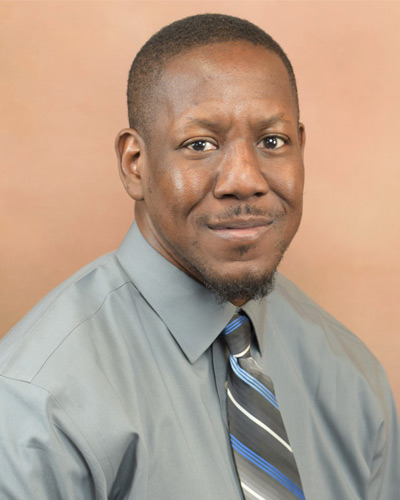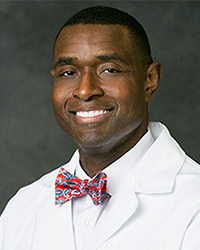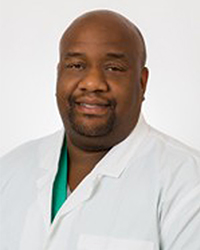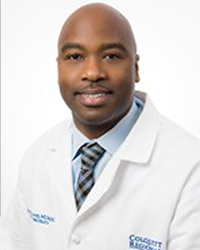Black Doctors in America
The State of the Black Male in Medicine
January 22, 2021 Robert Walker, PhD, associate professor of physiology at PCOM South Georgia recently moderated a panel of local physicians on the topic of the state of the Black
male in medicine.
Robert Walker, PhD, associate professor of physiology at PCOM South Georgia recently moderated a panel of local physicians on the topic of the state of the Black
male in medicine.
The panelists included Daryl Crenshaw, MD, Frederick Powell, MD, and Cheau Williams,
MD.
Together the panel discussed the identity, health and wellness of the Black male with
the PCOM community including students, staff and faculty. The group of Black male
physicians touched on discrimination, microaggressions and racial disparities experienced
by physicians of color both in and out of the healthcare setting while underlining
the importance of increasing the number of Black men in medicine through exposure,
inspiration and mentorship.
Dr. Crenshaw, a nephrologist at Archbold Medical Center in Thomasville and adjunct
professor at PCOM South Georgia, grew up with two parents in the home, something he
considered an extreme advantage.
“We’re in a tremendous dilemma at this time. Black men have been walking around with
one chain on their leg from the beginning,” said Dr. Crenshaw, referring to the lack
of male role models. “If they don’t have a male figure in their home, it puts them
at a serious disadvantage, not to mention the economic and social factors that also
impact them.”
According to the American Osteopathic Association (AOA), osteopathic medical schools
across the country saw 30,367 applicants in 2018. Only 1.19% of admitted students
were Black males. In comparison, PCOM South Georgia received 233 applications from
Black students in 2019-2020. The College accepted 27 of those students and had eight
of the accepted students join the Doctor of Osteopathic Medicine program--accepting
11.5% of applicants and matriculating 3.4%. Of those Black students, five were male
and three were female.
“Black men have a better chance of making it to the NBA than to osteopathic medical
school,” said the moderator, Dr. Walker.
 |
 |
 |
| Daryl Crenshaw, PhD |
Frederick Powell, MD |
Cheau Williams, MD |
The panelists highlighted the impact that mentors can make in the lives of young Black
men, which many of them had experienced first-hand. Marcine Pickron-Davis, PhD, PCOM Chief Campus and Community Relations Officer, emphasized the importance of
mentoring.
“As we know, representation matters. Connecting with other Black male physicians is
key to the success of Black male students persevering through medical school,” she
said.
Dr. Crenshaw, an Alabama native who grew up in one of the poorest counties in the
country, said he has always faced microaggressions and continues to do so as a physician.
“We have to perform and maintain a high level of calling that supersedes the microaggressions
that we experience. We have to give our Black males the nudge to do great and help
them achieve their dreams,” he said.
Dr. Williams, a gynecologist with Colquitt Regional Medical Center, agreed and added
that he never would have gone to medical school without the push of a colleague and
mentor.
“I was working as a nurse practitioner when a physician looked at me and said, ‘So,
when are you going to medical school?’” he said. “If it weren’t for him, I wouldn’t
be here. If we can shift the paradigm so that young students know that it’s cool to
be smart, there will be a trickle down effect where they are able to take care of
themselves and their future families.”
The PCOM admissions team knows the importance of a diverse student body.
“We actively recruit and admit a student body that reflects the diverse communities
in South Georgia,” said Dana Brooks, assistant director of admissions. “Research shows
that physicians from similar ethnic backgrounds and from medically underserved communities
are more likely to care for patients of those same backgrounds.”
To learn more about how PCOM respects, encourages and promotes diversity, visit the
Office of Diversity and Community Relations.
About PCOM South Georgia
In 2019, Philadelphia College of Osteopathic Medicine (PCOM), a premier osteopathic
medical school established in 1899, extended its commitment to the Southeast by establishing
PCOM South Georgia. An additional teaching location in Moultrie, Georgia, PCOM South Georgia offers both
a full, four-year medical program leading to the Doctor of Osteopathic Medicine (DO)
degree and a Master of Science in Biomedical Sciences. PCOM is a private, not-for-profit
institution that trains professionals in the health and behavioral sciences fields.
Joining PCOM Georgia in Suwanee in helping to meet the healthcare needs of the state, PCOM South Georgia
focuses on educating physicians for the region. For more information, visit pcom.edu or call 229-668-3110.
Contact Us
For general media inquiries, please contact the Office of Marketing and Communications
at 215-871-6300 or communications@pcom.edu. Visit our media relations page to view contact information for public relations personnel.
Connect with PCOM South Georgia





